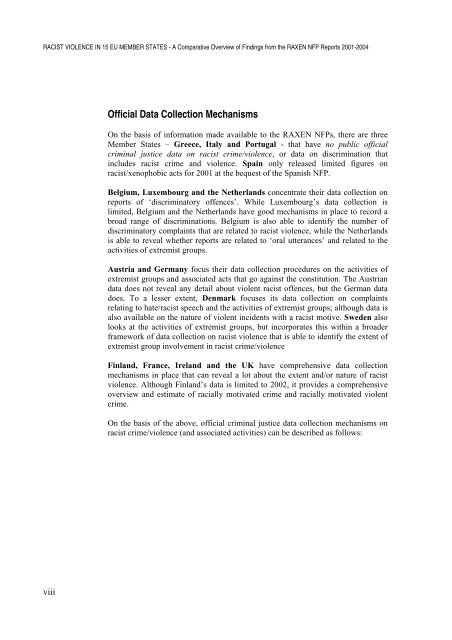RACIST VIOLENCE IN 15 EU MEMBER STATES - Cospe
RACIST VIOLENCE IN 15 EU MEMBER STATES - Cospe
RACIST VIOLENCE IN 15 EU MEMBER STATES - Cospe
Create successful ePaper yourself
Turn your PDF publications into a flip-book with our unique Google optimized e-Paper software.
<strong>RACIST</strong> <strong>VIOLENCE</strong> <strong>IN</strong> <strong>15</strong> <strong>EU</strong> <strong>MEMBER</strong> <strong>STATES</strong> - A Comparative Overview of Findings from the RAXEN NFP Reports 2001-2004<br />
Official Data Collection Mechanisms<br />
On the basis of information made available to the RAXEN NFPs, there are three<br />
Member States – Greece, Italy and Portugal - that have no public official<br />
criminal justice data on racist crime/violence, or data on discrimination that<br />
includes racist crime and violence. Spain only released limited figures on<br />
racist/xenophobic acts for 2001 at the bequest of the Spanish NFP.<br />
Belgium, Luxembourg and the Netherlands concentrate their data collection on<br />
reports of ‘discriminatory offences’. While Luxembourg’s data collection is<br />
limited, Belgium and the Netherlands have good mechanisms in place to record a<br />
broad range of discriminations. Belgium is also able to identify the number of<br />
discriminatory complaints that are related to racist violence, while the Netherlands<br />
is able to reveal whether reports are related to ‘oral utterances’ and related to the<br />
activities of extremist groups.<br />
Austria and Germany focus their data collection procedures on the activities of<br />
extremist groups and associated acts that go against the constitution. The Austrian<br />
data does not reveal any detail about violent racist offences, but the German data<br />
does. To a lesser extent, Denmark focuses its data collection on complaints<br />
relating to hate/racist speech and the activities of extremist groups; although data is<br />
also available on the nature of violent incidents with a racist motive. Sweden also<br />
looks at the activities of extremist groups, but incorporates this within a broader<br />
framework of data collection on racist violence that is able to identify the extent of<br />
extremist group involvement in racist crime/violence<br />
Finland, France, Ireland and the UK have comprehensive data collection<br />
mechanisms in place that can reveal a lot about the extent and/or nature of racist<br />
violence. Although Finland’s data is limited to 2002, it provides a comprehensive<br />
overview and estimate of racially motivated crime and racially motivated violent<br />
crime.<br />
On the basis of the above, official criminal justice data collection mechanisms on<br />
racist crime/violence (and associated activities) can be described as follows:<br />
viii
















